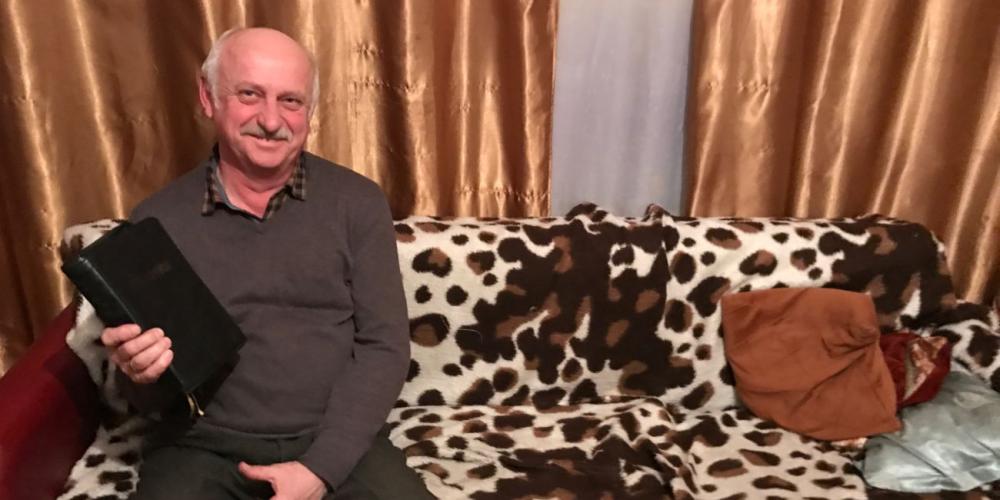Searching Scripture for Permission to Drink Vodka at Easter
An Adventist leads Bible Q&A sessions at his workplace in Kazakhstan.
Employees of a beverage company in the former Soviet republic of Kazakhstan enjoy discussing politics during their lunch break. But one of them, Sergei Sokol, likes to steer the topic toward the Bible.
So he was pleased when a coworker announced the other day that Easter should be celebrated with a shot of vodka, painted eggs, and kulich, a traditional Easter bread in the Orthodox Christian faith.
“What does the Bible say about this holiday?” said Sokol, a Seventh-day Adventist who works as chief engineer at the company.
His coworkers didn’t know what to say.
Sokol went to his office and returned with his Bible. Opening it, he and his coworkers found no mention of Easter as a holiday celebrating Jesus’ resurrection from the dead. But they did find numerous references to the Jewish Passover, which in their native Russian language has the same name as Easter: пасха. The workers reviewed Bible verses such as Exodus 12:8, where God instructed the Israelites on the first Passover to eat a roasted lamb or goat “with unleavened bread and with bitter herbs” (NKJV).
“Then they asked me with surprise, ‘Where is the vodka, the painted eggs, and the kulich?’” Sokol said in an interview.
“I really like these conversations,” he added with a smile.
Coworkers ply Sokol with so many questions about his Adventist faith that he has organized semi-regular Q&A sessions during lunchbreak at his workplace in Pavlodar, an industrial city of 300,000 people in predominantly Muslim Kazakhstan.
Sharing the Christian faith is challenging in this predominantly Muslim country of 17 million people and only 3,500 Adventists, church leaders said. Muslims and Orthodox Christians, the other major religious denomination, look down on Adventists and other Protestants, dismissively referring to them as sectarians.
Sokol, however, is a good role model for all Adventists, said Andrei Akava, district pastor for the seven Adventist churches and one company located in Pavlodar and the surrounding region.
“Wherever we are working, we need to share our faith,” Akava said. “There is no reason to keep it a secret. We need to be open.”
Open About Faith
Sokol said he has been open about his Adventist faith from his first day on the job at the beverage company. Everyone knows he is an Adventist.
“When I first came to the company, they quickly learned that I was not an Orthodox Christian, and they said behind my back: ‘That guy is a sectarian. He’s not a bad guy but a sectarian.’”
Sokol said he did not mind the disdainful remarks and prayed for wisdom on how to share his hope in Jesus’ Second Coming. He wondered how to share religious literature with his coworkers.
“Then God told me, ‘Every person has a birthday,” he said.
Sokol began to congratulate coworkers and present them with gifts on their birthdays.
“Now everyone at my workplace has received a copy of ‘The Great Controversy’ and ‘Steps to Christ,” he said, referring to two books by Adventist Church cofounder Ellen G. White.
He also has handed out Bibles.
Coworkers do not put the books on a shelf at home but read them and then ask questions at work.
Those questions prompted Sokol to start the lunch-break Q&A sessions. The meetings, which last just three to five minutes, have covered issues ranging from Christmas to sin. Sokol said the most popular question, which he has been asked multiple times, is: “If God is so loving and caring, why is there so much evil in the world?” In reply, he opens the Bible to the first book of Genesis and shares the story of how sin entered the world.
Company management is aware of the meetings and has no problem with them, Sokol said.
Praying Sabbath School Class
Sokol said he is not a Bible scholar and only began organizing the Q&A sessions at the encouragement of his Sabbath School class at the Southern Seventh-day Adventist Church in Pavlodar. About 85 adults and 15 children worship at the church every Sabbath.
Members of Sokol’s Sabbath School class pray faithfully for Sokol and his outreach work during the week, pastor Akava said.
When the church opened a community health center offering free massage therapy on its premises in fall 2016, Sokol invited his coworkers to sign up. Three women agreed to go, and he took them on a tour of the church's main sanctuary, small hall, and children’s room before the message session.
The visitors ended up receiving 10 days of massage therapy, and they praised the Adventist Church to their coworkers.
“Their attitude changed toward me,” Sokol said. “They said: ‘We thought you belonged to a sect. But it turns out that this is a church — and not just a church but a good church.”
Meanwhile, attendance has been growing at the Q&A sessions, with eight to 12 people showing up at three gatherings in November. At the most recent meeting this week, coworkers asked Sokol to expand the discussion time to 30 minutes starting in January.
“I don’t think that I am doing anything special,” Sokol said about his desire to share his love for Jesus. “This is just what I do.”
A portion of the Thirteenth Sabbath Offering for fourth quarter 2017 will help fund the opening of the first Seventh-day Adventist preschool in Pavlodar, Kazakhstan.





